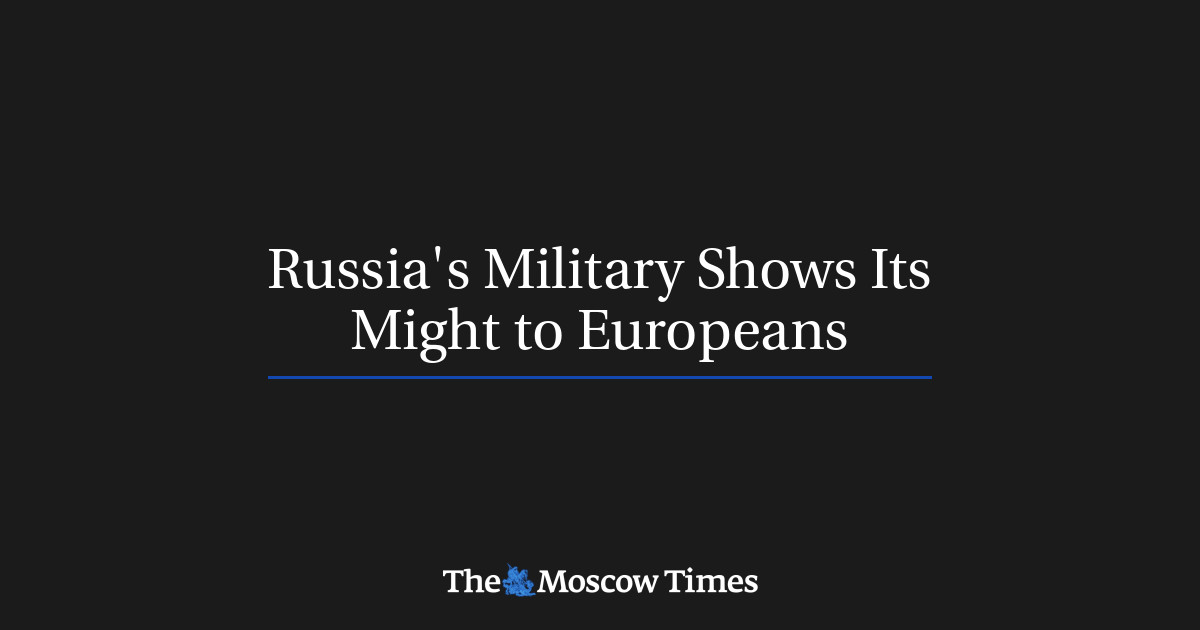The Implications Of Russia's Military Moves For European Security

Table of Contents
Increased Military Threat to NATO and Eastern European Countries
Russia's amplified military presence near NATO borders poses a significant challenge to European security. The heightened tensions along the eastern flank are particularly alarming, demanding a careful assessment of the potential for escalation.
Heightened Tensions along the Eastern Flank
The increased military activity near the borders of Ukraine, Poland, and the Baltic states is undeniable. This includes:
- Large-scale military exercises: These drills, often involving advanced weaponry and a substantial troop deployment, demonstrate Russia's readiness for potential conflict.
- Deployment of advanced weaponry: The positioning of sophisticated weapons systems near NATO borders signals a clear threat and increases the risk of miscalculation.
- Aggressive rhetoric from Russian officials: Provocative statements and bellicose language further escalate tensions and create a climate of fear and uncertainty.
This heightened military posture significantly impacts regional stability, causing considerable anxiety among civilian populations in bordering countries. The potential for accidental escalation or a deliberate act of aggression remains a very real and concerning possibility.
The Resurgence of Russian Military Doctrine
Russia's updated military strategies represent a fundamental shift in its approach to warfare, posing considerable challenges to European security. Key elements of this resurgence include:
- Modernization of its arsenal: Russia is investing heavily in advanced weaponry, including hypersonic missiles and improved cyber warfare capabilities.
- Emphasis on hybrid warfare: This approach combines conventional military action with information warfare, cyberattacks, and economic pressure to achieve strategic goals.
- Assertion of its sphere of influence: Russia continues to challenge the existing post-Cold War security architecture, undermining the sovereignty and security of its neighbors.
These developments challenge NATO's defensive capabilities, requiring a reassessment of its strategies and resources. The potential for unconventional warfare tactics, including cyberattacks targeting critical infrastructure, adds another layer of complexity to the challenge.
The Impact on European Energy Security
Russia's role as a major energy supplier to Europe gives it considerable leverage, and its military actions are frequently used to exert political and economic pressure.
Russia's Energy Leverage
Russia's control over crucial energy pipelines and its influence on gas prices have repeatedly demonstrated its capacity to use energy as a geopolitical weapon. This includes:
- Disruptions to gas supplies: The manipulation of gas flows has created energy crises in several European countries, causing economic hardship and public discontent.
- Price volatility: Russia’s ability to influence gas prices has exacerbated energy insecurity and increased vulnerability across the EU.
- Political pressure: The threat of reduced or cut-off gas supplies has been used to influence European policy decisions.
Diversifying energy sources is crucial to reducing dependence on Russia and mitigating the risks associated with its energy leverage.
Investment in Renewable Energy and Energy Independence
The urgency to reduce reliance on Russian energy has prompted a significant shift towards renewable energy sources across Europe. This includes:
- Increased investments in renewable energy infrastructure: European countries are investing heavily in solar, wind, and other renewable energy technologies.
- Development of energy storage solutions: Solutions for storing renewable energy are crucial to addressing intermittency issues.
- Strengthening of energy grids: Improved energy infrastructure will increase resilience and reduce reliance on single sources.
This transition towards energy independence will not only enhance security but also contribute to climate change mitigation goals.
The Geopolitical Implications for the European Union
Russia's military moves have significantly impacted the EU's geopolitical standing, necessitating a strong response and fostering closer transatlantic ties.
Strengthening Transatlantic Ties
The shared threat posed by Russia has strengthened the relationship between the EU and the US, leading to increased military cooperation:
- Increased joint military exercises: These exercises enhance interoperability and improve readiness to respond to potential threats.
- Strengthened intelligence sharing: Collaborative intelligence gathering helps to monitor Russian activity and prevent potential aggression.
- Reinforcement of NATO's eastern flank: The deployment of additional NATO troops to Eastern Europe demonstrates a collective commitment to deter Russian aggression.
This enhanced collaboration is vital for ensuring the security and stability of the European continent.
The EU's Response to Russian Aggression
The EU has responded to Russia's military actions through a range of measures, including:
- Imposition of sanctions: These sanctions target individuals, businesses, and sectors within the Russian economy.
- Diplomatic efforts: The EU continues to pursue diplomatic solutions to de-escalate tensions and find peaceful resolutions to conflicts.
- Strengthening of defense capabilities: The EU is investing in its own defense capabilities to reduce reliance on the US.
However, maintaining a unified EU response to Russia's aggression remains a complex challenge, given the varying interests and priorities of its member states.
Conclusion
Russia's military moves pose a multifaceted threat to European security, impacting NATO's eastern flank, energy supplies, and the geopolitical landscape of the EU. The increased military threat necessitates a strong and coordinated response from NATO and the EU. The impact on European energy security underscores the need for diversification and investment in renewable energies. The geopolitical ramifications require strengthened transatlantic ties and a unified EU response. Staying informed about the evolving situation and engaging in discussions about effective mitigation strategies is crucial. We need to understand the implications of Russia's military buildup for European security and work collaboratively to address these critical challenges. Continue learning about the complexities of Russia's military actions and European security through further research and analysis to ensure a secure and stable future for Europe.

Featured Posts
-
 Private Consortium Of Elite Universities Defies Trump Administration
Apr 29, 2025
Private Consortium Of Elite Universities Defies Trump Administration
Apr 29, 2025 -
 Fatal Shooting Of Georgia Deputy During Traffic Stop
Apr 29, 2025
Fatal Shooting Of Georgia Deputy During Traffic Stop
Apr 29, 2025 -
 Teen Sentenced For Murder Following Deadly Rock Throwing Incident
Apr 29, 2025
Teen Sentenced For Murder Following Deadly Rock Throwing Incident
Apr 29, 2025 -
 Understanding And Managing Adult Adhd A Practical Guide
Apr 29, 2025
Understanding And Managing Adult Adhd A Practical Guide
Apr 29, 2025 -
 American Manufacturing Overcoming The Barriers
Apr 29, 2025
American Manufacturing Overcoming The Barriers
Apr 29, 2025
Latest Posts
-
 Schoofs No Show Debate On Fabers Honours Veto Ignored
May 12, 2025
Schoofs No Show Debate On Fabers Honours Veto Ignored
May 12, 2025 -
 Win Big At The B And W Trailer Hitches Heavy Hitters Tournament Smith Mountain Lake Next Week 100 000 Payday
May 12, 2025
Win Big At The B And W Trailer Hitches Heavy Hitters Tournament Smith Mountain Lake Next Week 100 000 Payday
May 12, 2025 -
 Faber Honours Refusal Schoofs Absence From Debate Fuels Speculation
May 12, 2025
Faber Honours Refusal Schoofs Absence From Debate Fuels Speculation
May 12, 2025 -
 Smith Mountain Lake Bass Fishing Tournament B And W Heavy Hitters All Star Event 100 000 Prize
May 12, 2025
Smith Mountain Lake Bass Fishing Tournament B And W Heavy Hitters All Star Event 100 000 Prize
May 12, 2025 -
 100 000 Bass Fishing Tournament B And W Trailer Hitches Heavy Hitters Event At Smith Mountain Lake Next Week
May 12, 2025
100 000 Bass Fishing Tournament B And W Trailer Hitches Heavy Hitters Event At Smith Mountain Lake Next Week
May 12, 2025
